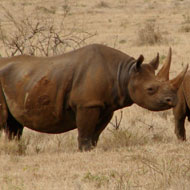
Cause of death currently thought to be salt poisoning
An investigation has been launched in Kenya after eight critically endangered black rhinos died during a relocation exercise.
The animals were part of a group of 11 rhinos being moved from Nairobi National Park and Nakuru National Park, to a newly created sanctuary in Tsavo East National Park.
Preliminary investigations suggest the rhinos died from salt poisoning, as a result of drinking high salinity water on arrival at the sanctuary.
According to a statement from the Ministry of Tourism and Wildlife, there appears to have been a challenge in adapting from fresh water to saline water in the new environment. It is thought high salt levels led to dehydration, triggering the thirst mechanism and excess intake of saline water, which exacerbated the problem.
The surviving three rhinos are being closely monitored by veterinary and park management teams. Fresh water is being provided in temporary water pans whilst officials wait for the post-mortem report and further forensic investigations.
Kenya Wildlife Service (KWS) was translocating the rhinos as part of an initiative to create a new population. There had been plans to move a total of 14 rhinos.
KWS has been instructed to suspend the ongoing translocation of black rhinos and there will be external, independent investigations into the deaths, which the ministry said are ‘unprecedented’ in KWS operations.
Cabinet secretary Najib Balala said disciplinary action will be taken if the findings suggest there has been negligence or unprofessional misconduct on the part of any KWS officers.
She added that the translocation and immobilisation of rhinos has been a success story in Kenya over the years, with very low mortality rates. Between 2005 and 2017, 149 rhinos were translocated with eight mortalities, excluding the recent deaths.
Image by Harald Zimmer/GNU Free Documentation License



 The Veterinary Medicines Directorate (VMD) is inviting applications from veterinary students to attend a one-week extramural studies (EMS) placement in July 2026.
The Veterinary Medicines Directorate (VMD) is inviting applications from veterinary students to attend a one-week extramural studies (EMS) placement in July 2026.